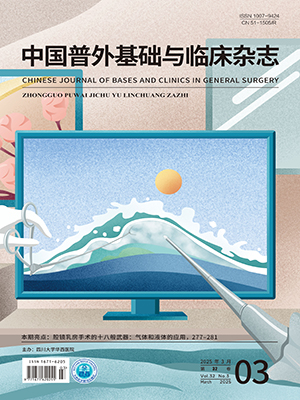| 1. |
陈万青, 郑荣寿, 张思维, 等. 2013年中国恶性肿瘤发病和死亡分析. 中国肿瘤, 2017, 26(1): 1-7.
|
| 2. |
Raza A, Sood GK. Hepatocellular carcinoma review: current treatment, and evidence-based medicine. World J Gastroenterol, 2014, 20(15): 4115-4127.
|
| 3. |
Yoo YG, Christensen J, Huang LE. HIF-1α confers aggressive malignant traits on human tumor cells independent of its canonical transcriptional function. Cancer Res, 2011, 71(4): 1244-1252.
|
| 4. |
Dai CX, Gao Q, Qiu SJ, et al. Hypoxia-inducible factor-1 alpha, in association with inflammation, angiogenesis and MYC, is a critical prognostic factor in patients with HCC after surgery. BMC Cancer, 2009, 9: 418.
|
| 5. |
Daponte A, Ioannou M, Mylonis I, et al. Prognostic significance of hypoxia-inducible factor 1 alpha (HIF-1 alpha) expression in serous ovarian cancer: an immunohistochemical study. BMC Cancer, 2008, 8: 335.
|
| 6. |
孙海香, 杨欣荣, 徐泱, 等. 肝癌肝动脉化疗栓塞治疗对缺氧诱导因子2α表达的影响及其临床意义. 中国临床医学, 2013, 20(1): 8-9.
|
| 7. |
Muz B, de la Puente P, Azab F, et al. The role of hypoxia in cancer progression, angiogenesis, metastasis, and resistance to therapy. Hypoxia (Auckl), 2015, 3: 83-92.
|
| 8. |
Chen J, Zhang Y, Cai H, et al. Comparison of the effects of postoperative prophylactic transcatheter arterial chemoembolization (TACE) and transhepatic arterial infusion (TAI) after hepatectomy for primary liver cancer. J BUON, 2018, 23(3): 629-634.
|
| 9. |
郝朗松, 张忠民, 伍晓汀. 肿瘤细胞能量代谢机理的研究进展. 中国普外基础与临床杂志, 2010, 17(1): 97-101.
|
| 10. |
Doktorova H, Hrabeta J, Khalil MA, et al. Hypoxia-induced chemoresistance in cancer cells: the role of not only HIF-1. Biomed Pap Med Fac Univ Palacky Olomouc Czech Repub, 2015, 159(2): 166-177.
|
| 11. |
郑见宝, 孙学军, 王炜, 等. HIF-1α与CDX2在结直肠腺癌组织中的表达及意义. 中国普外基础与临床杂志, 2010, (12): 1265-1269.
|
| 12. |
Adams JM, Difazio LT, Rolandelli RH, et al. HIF-1: a key mediator in hypoxia. Acta Physiol Hung, 2009, 96(1): 19-28.
|
| 13. |
Holland JD, Klaus A, Garratt AN, et al. Wnt signaling in stem and cancer stem cells. Curr Opin Cell Biol, 2013, 25(2): 254-264.
|
| 14. |
Tarapore RS, Siddiqui IA, Mukhtar H. Modulation of Wnt/β-catenin signaling pathway by bioactive food components. Carcinogenesis, 2012, 33(3): 483-491.
|
| 15. |
Xie Q, Mittal S, Berens ME. Targeting adaptive glioblastoma: an overview of proliferation and invasion. Neuro Oncol, 2014, 16(12): 1575-1584.
|
| 16. |
Brabletz T, Jung A, Spaderna S, et al. Opinion: migrating cancer stem cells—an integrated concept of malignant tumour progression. Nat Rev Cancer, 2005, 5(9): 744-749.
|
| 17. |
Danet GH, Pan Y, Luongo JL, et al. Expansion of human SCID-repopulating cells under hypoxic conditions. J Clin Invest, 2003, 112(1): 126-135.
|
| 18. |
Yun Z, Lin Q. Hypoxia and regulation of cancer cell stemness. Adv Exp Med Biol, 2014, 772: 41-53.
|
| 19. |
Wang P, Wan WW, Xiong SL, et al. Cancer stem-like cells can be induced through dedifferentiation under hypoxic conditions in glioma, hepatoma and lung cancer. Cell Death Discov, 2017, 3: 16105.
|
| 20. |
Santoyo-Ramos P, Likhatcheva M, García-Zepeda EA, et al. Hypoxia-inducible factors modulate the stemness and malignancy of colon cancer cells by playing opposite roles in canonical Wnt signaling. PLoS One, 2014, 9(11): e112580.
|
| 21. |
Rankin EB, Giaccia AJ. The role of hypoxia-inducible factors in tumorigenesis. Cell Death Differ, 2008, 15(4): 678-685.
|
| 22. |
Castelli G, Pelosi E, Testa U. Liver cancer: molecular characterization, clonal evolution and cancer stem cells. Cancers (Basel), 2017, 9(9): E127.
|
| 23. |
Vadde R, Vemula S, Jinka R, et al. Role of hypoxia-inducible factors (HIF) in the maintenance of stemness and malignancy of colorectal cancer. Crit Rev Oncol Hematol, 2017, 113: 22-27.
|
| 24. |
Masson N, Ratcliffe PJ. Hypoxia signaling pathways in cancer metabolism: the importance of co-selecting interconnected physiological pathways. Cancer Metab, 2014, 2(1): 3.
|
| 25. |
Yuen TJ, Silbereis JC, Griveau A, et al. Oligodendrocyte-encoded HIF function couples postnatal myelination and white matter angiogenesis. Cell, 2014, 158(2): 383-396.
|




